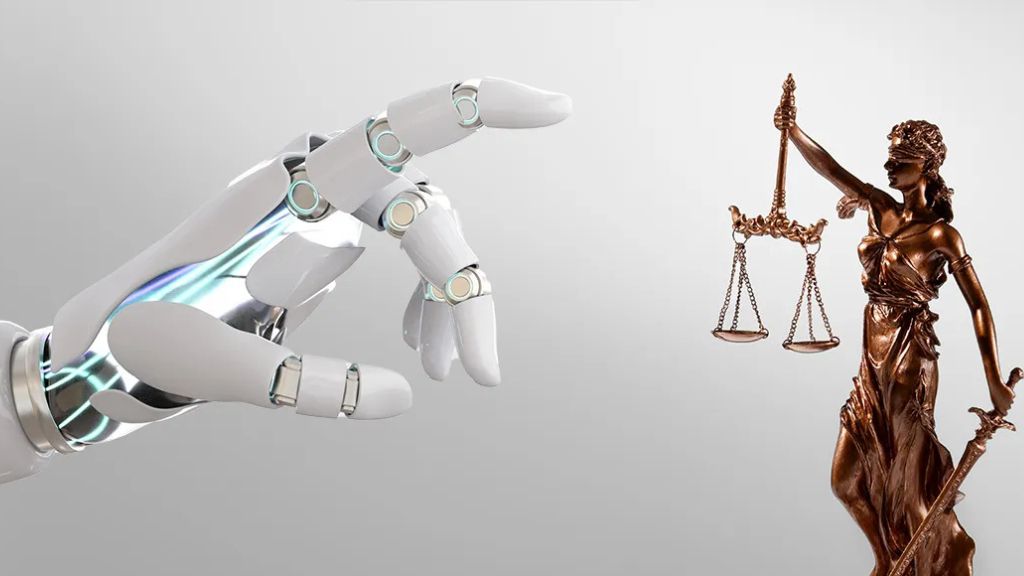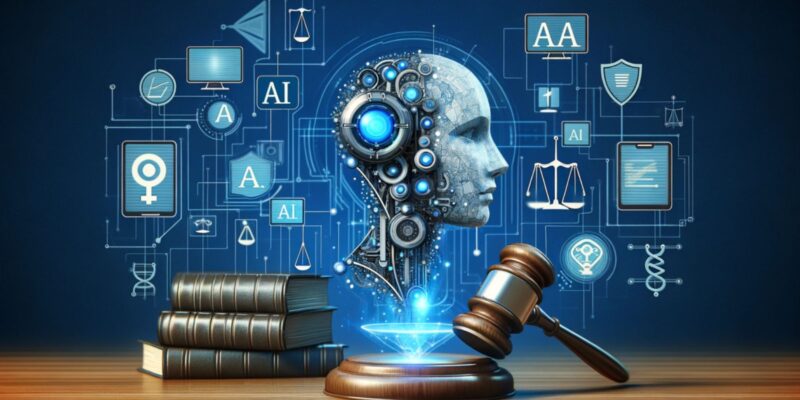| বাংলায় পড়ুন | Researchers and Reporters: Shama Sultana Ayesha Maria |
Technology is advancing at a rapid pace these days. The creation of artificial intelligence (AI) is the most significant development of this era. AI is presenting the world with possibilities as well as challenges.
The technology known as artificial intelligence, or AI, uses data analysis to create a machine or application more intelligent and capable than a human. In actuality, artificial intelligence law refers to the legal framework surrounding artificial intelligence (AI) situations.
Questions like who will be in charge if artificial intelligence is developed, who will be held accountable if it provides inaccurate information, and what would happen if artificial intelligence was used to violate human privacy must all be addressed in the “Artificial Intelligence” Act. Lawmaking regarding artificial intelligence (AI) has become crucial since AI is now utilized in practically every part of our lives.

A symbolic image highlighting the importance and relevance of AI legislation. | Photo: Collected.
The representatives and lawmakers of European Union (EU) member states reached a preliminary agreement on drafting an artificial intelligence law on December 9, 2023, following over 36 hours of discussion on the application of AI in facial recognition. Artificial intelligence technology is to be regulated by this historic accord. The first Artificial Intelligence (AI) law in history was passed by the European Union (EU) on March 13, 2024.
We could not have predicted how quickly technology would evolve, but it has greatly simplified our daily lives. Nowadays, academics are studying artificial intelligence to learn how to create intelligent software and computers. As a result, nations everywhere are drafting new rules and legislation to ensure that AI is used appropriately.
However, the growth in criminal activity has been caused by many misuses of artificial intelligence, like voice cloning and deepfake films. Bangladesh will therefore implement artificial intelligence or artificial intelligence policies. Bangladesh’s ‘Artificial Intelligence’ Act was introduced, according to a September announcement made by former Law Minister Anisul Huq. However, the current state of affairs in Bangladesh indicates that this law’s enactment is somewhat delayed.
Artificial intelligence (AI) has several noteworthy advantages, including the ability to precisely identify cancer in its early stages in the medical profession and the ability to analyze vast volumes of data fast and precisely in sectors like healthcare and finance that deal with a lot of data and figures. Robots with AI capabilities can carry out repetitive or hazardous jobs in factories on their own when instructed to do so. When it comes to evaluating legal documents and interpreting languages, AI is very effective.
can also suggest items from online retailers depending on your tastes. Chatbots driven by AI can work continuously to offer 24/7 customer support. AI speeds up scientific and medical research, for example. AI is employed for environmental protection, such as tracking endangered species or monitoring pollution levels.

An AI-powered chatbot created using AI technology. | Photo: Collected.
These are but a few instances of how AI can help humanity. Despite its numerous benefits, artificial intelligence has certain drawbacks. Consequently, using its enhanced version can be costly, and the AI can occasionally be biased. AI could pose security threats and replace some occupations. We will now be aware of a few additional adverse features-
Because it requires specialized technology, software, and skilled personnel, creating AI systems can be costly. Additionally, developing and sustaining AI systems calls for highly skilled technical expertise. The growing demand for AI talents cannot be met by the number of qualified people we now have. Biases in the data used to train AI systems can be passed down to them. AI models are frequently put through difficult tasks that require them to perform beyond what they were trained to do. Human workers are increasingly being replaced by AI in several jobs, and the worrying thing is that AI systems are susceptible to cyberattacks.
A law that aims to provide standard computer security regulations throughout Europe was created by the European Union. Additionally, India has enacted legislation that establishes new guidelines for its digital governance. Computer security, data privacy, and the moral application of AI are all covered by the Act. Additionally, Vietnam has passed legislation aimed at digitally revolutionizing its government, economy, and society. Because of this rule, Vietnamese tech companies are attempting to compete with businesses worldwide.

The European Union’s AI legislation process. | Photo: Collected.
Likewise, our aspiration of a “Digital Bangladesh” hinges on our ability to effectively handle the intricacies of artificial intelligence. Promoting innovation and defending fundamental human rights will be the primary goals of the legislation that will be created to control the application of AI in Bangladesh.
Due to the advancement of artificial intelligence (AI), the world is changing quickly. Bangladesh has the chance to participate in this technology revolution as a country in South Asia. Therefore, Bangladesh must create policies for the responsible usage of AI. In the future, for instance, artificial intelligence might be used to improve agriculture, control traffic, and transform healthcare.
This future is only feasible if Bangladesh enacts laws or regulations that forbid the abuse of AI and improve and ease the country’s citizens’ daily lives.




























Comments